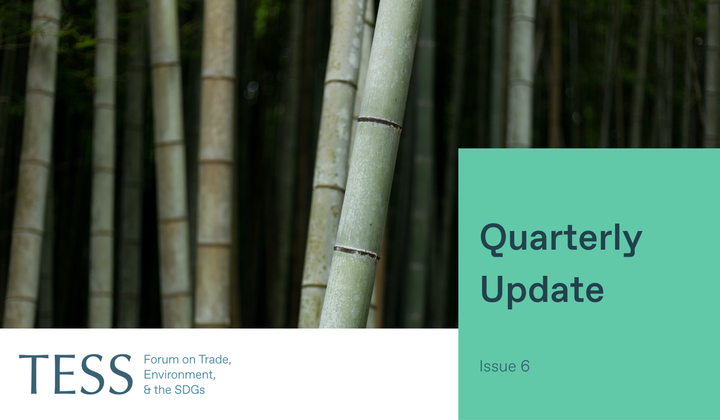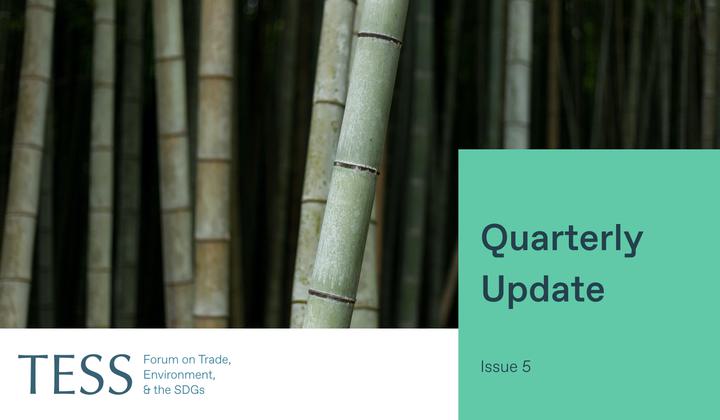Welcome to the eighth edition of the TESS Quarterly Update. In this issue, we start with a brief round-up of a selection of major international gatherings of direct relevance to our work, followed by updates on the activities and impacts that TESS has pursued this past quarter to foster multilateral cooperation and action on trade and sustainability. Look out for our new series of Synergies articles by leading experts on Reviving Multilateralism: From Vision to Action on Trade and Sustainability at the WTO.

Photo © WTO
In the wake of the Thirteenth WTO Ministerial Conference (MC13), which took place from 26 February–2 March 2024 in Abu Dhabi, there was considerable dismay among many advocates of sustainable trade about the failure of governments to conclude phase two of the fisheries negotiations and the absence of explicit commitment, or even mention, in the Abu Dhabi Ministerial Declaration of the importance of cooperation on issues of environment and climate. The summit also failed to reach agreement on critical issues like agriculture and food security or WTO reform among others. Yet, the vast majority of WTO members did, in many respects, affirm they are ready to engage and build cooperation on sustainability and trade and there is considerable momentum in this regard that can be built upon.
Meeting on the eve of MC13, for example, the Coalition of Trade Ministers on Climate issued a Communiqué and Menu of Voluntary Actions (see below). In addition, a broad majority of WTO members, including a diversity of both developed and developing countries, presented perspectives and priorities related to environmental challenges in their ministerial statements, and supported the continued revitalization of discussions on these topics in the Committee on Trade and Environment.
In addition, over half of the WTO’s membership, covering more than 85% of global trade, reinforced their support for one or more of the three member-led initiatives on environmental sustainability, plastic pollution, and fossil fuel subsidy reform. Notably, the Dialogue on Plastic Pollution (DPP) circulated a ministerial statement that identifies areas for international cooperation in pursuit of concrete outcomes on the trade dimensions of plastic pollution. Similarly, the co-convenors of the Trade and Environmental Sustainability Structured Discussions (TESSD) issued a statement, an updated work plan, and a series of outcome documents summarizing the work of its four working groups. Finally, co-sponsors of the Fossil Fuel Subsidy Reform (FFSR) initiative issued an updated ministerial statement and a set of options to advance reform.
In other WTO news, it was announced that the next Aid for Trade Global Review will take place from 26–28 June 2024 under the theme “Mainstreaming Trade.” The review will offer opportunities to explore how aid for trade can support trade-related contributions and responses to the sustainable development priorities of developing countries, including in relation to environmental challenges. The WTO has also announced that the theme of the 2024 Public Forum to be held from 10–13 September will be “Re-globalization: Better Trade for a Better World.”
Finally, on 15 April, Director-General Ngozi Okonjo-Iweala marked the 30th anniversary of the Marrakesh Agreement establishing the WTO. A dedicated webpage commemorating the anniversary and the “spirit of Marrakesh” is available.

Photo by Hermes Rivera on Unsplash
During the quarter, the sixth session of the United Nations Environment Assembly (UNEA-6) convened in Nairobi, Kenya from 26 February to 1 March 2024 under the theme “Effective, inclusive and sustainable multilateral actions to tackle climate change, biodiversity loss and pollution.” For the first time, the UNEA session dedicated an entire day to multilateral environmental agreements (MEA Day) to identify cross-cutting issues and explore how the various MEAs can better cooperate on pressing and interlinked global environmental challenges. In her closing remarks, UNEP Executive Director Inger Anderson noted that “the weaving of a stronger MEA tapestry” is essential to ensure that each agreement “delivers even better results.” In 2024, the conferences of the parties of all three Rio Conventions (CBD, UNCCD, UNFCCC) will be meeting.
From 23–29 April 2024, the fourth session of the Intergovernmental Negotiating Committee to develop an international legally binding instrument on plastic pollution, including in the marine environment (INC-4) is underway in Ottawa, Canada. At this penultimate of five scheduled sessions to complete the negotiations before the end of 2024, delegates are tasked with advancing negotiations on a revised draft text of the future instrument. TESS will be on the ground supporting governments seeking to achieve an ambitious treaty (see below).
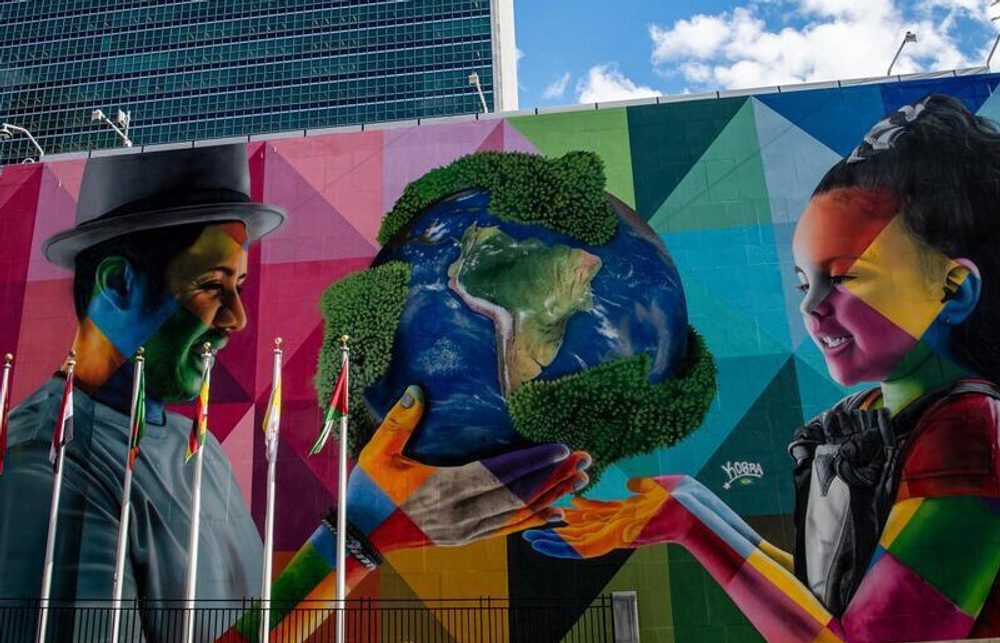
Photo © UN Photo/Rick Bajornas
On 25–26 March, UNCTAD (rebranded as UN Trade and Development to mark its 60th anniversary) co-organized with partners the 7th BioTrade Congress under the theme “Global Governance for Trade and Biodiversity,” aimed to focus on trade and trade policy recommendations and actions that can accelerate implementation of the Kunming-Montreal Global Biodiversity Framework. Documents, presentations, and recordings from the two-day meeting are available. Additionally, from 22–26 April, the 14th session of the Trade and Development Commission is discussing pathways to navigate the challenges raised by increasing demand for critical energy transition minerals and the potential role of sustainable fuels in facilitating the transition of maritime transport and their trade and development implications.
In other UN news, from 15–19 April 2024, the President of the UN General Assembly convened a series of meetings at the UN Headquarters in New York as part of the first-ever Sustainability Week, with high-level thematic events on issues including debt sustainability, sustainable transport, global resilience, and a global stocktaking marking the completion of the UN Decade of Sustainable Energy for All.
Meanwhile, preparations are underway for the UN Summit of the Future scheduled for September 2024. The summit aims to accelerate efforts to meet existing international commitments. A zero draft of the Pact for the Future was released in January 2024 as a starting point for negotiations on a wide-ranging and action-oriented Pact for the Future in the lead-up to and during the summit.
What We've Focused On
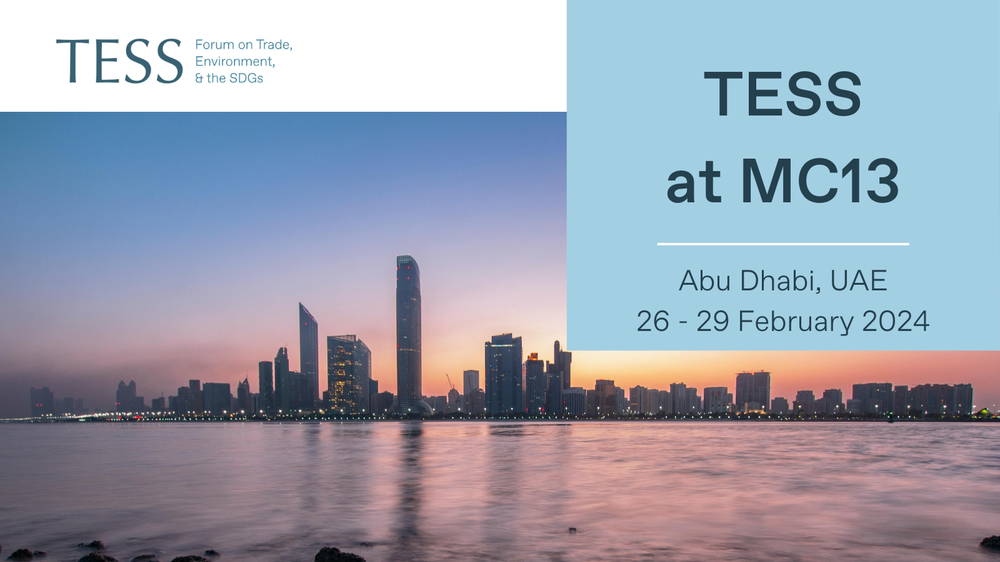
Thirteenth WTO Ministerial Conference
As governments and stakeholders gathered for MC13, TESS stepped up work to foster inclusive international cooperation on a trading system that works for sustainability. In this spirit, Carolyn Deere Birkbeck and TESS Head of Policy Analysis Strategy Christophe Bellmann published two op-eds around MC13 (see below). The first, released ahead of the gathering, argued for strong ministerial engagement to strengthen international cooperation on sustainability and trade. The second, released after the conference, provided a post-MC13 assessment and outlined options for forging a proactive response on sustainability at the WTO.
On the occasion of MC13, TESS also launched a new Synergies series titled From Vision to Action on Trade and Sustainability at the WTO (see below).
In Abu Dhabi, we brought together a broad range of experts and stakeholders for an informal stakeholder roundtable on Climate, Trade, and Sustainable Development. We then hosted and participated in a number of events as part of IISD’s Trade + Sustainability Hub in the margins of MC13. On behalf of the Coalition of Trade Ministers on Climate (see below), and in collaboration with E3G, we hosted a reception providing an opportunity to hear from a number of coalition ministers how inclusive cooperation on trade can make a positive contribution to the global climate agenda. We also co-hosted with IISD, The Pew Charitable Trusts, and UNCTAD a session on Fostering Trade-Related Cooperation on Plastic Pollution: The WTO Dialogue on Plastics Pollution beyond MC13 to highlight where trade-related cooperation can support global efforts to end plastic pollution across the full life cycle of plastics. This was followed by a session on Enabling a Just Transition: Trade and Industrial Policy Options for Developing Countries on Climate Action and Principles for Cooperation. Finally, TESS Executive Director Carolyn Deere Birkbeck spoke at the Trade + Sustainability Hub closing plenary on Where Next? Building Trade Cooperation in a Fractured World. Video recordings of all Hub sessions are available to watch.
Back in Geneva, we hosted in March and April informal meetings among developing country delegates on trade, environment, and sustainable development in the WTO context to provide an opportunity for these delegates to exchange views on priority areas for cooperation in the 2024. In April, we launched our series of Ambassadors’ Roundtables on Trade and Sustainability.
Cutting across all of our thematic work, in April we released a policy brief on Trade and Environment at the World Trade Organization: State of Play and Entry Points. In the wake of MC13 and as the WTO marks its 30th anniversary, the paper offers governments and stakeholders an overview of the range of entry points, institutional fora, and processes at the WTO where this interface is or can be addressed. Additionally, TESS has compiled excerpts from a review of ministerial declarations, decisions, and statements issued at MC13 where WTO members addressed issues of environment, climate, and sustainable development.

Climate Crisis
TESS continues to support the work of Coalition of Trade Ministers on Climate, which brings together 61 ministers from different regions and varying levels of development, climate vulnerabilities, and trade circumstances to foster inclusive international cooperation at the nexus of climate, trade, and sustainable development. TESS was nominated to act as the coalition’s Secretariat in February 2024. In January, we supported a coalition roundtable in Davos, for which a group of coalition ministers published an op-ed on breaking the silos between trade, climate, and finance. We also provided support for the coalition’s second annual ministerial meeting on 25 February in the margins of MC13. A key outcome of the meeting was the endorsement of a Communiqué, accompanied by a Menu of Voluntary Actions, with a clear call for the WTO to pursue ambitious commitments in support of the global response to the climate crisis
View our thematic work on the climate crisis.

Plastic Pollution
In the lead-up to and after MC13, TESS continued active engagement with the WTO Dialogue on Plastic Pollution. At the DPP Plenary meeting in January, we provided comments on the finalized text of the MC13 Statement, expressing the view that both the statement and its attached factual list of compilations were a positive step forward. At a DPP Pre-Plenary meeting on 12 April, we emphasized that realizing the MC13 statement’s commitment to make progress towards “concrete, pragmatic and effective outcomes” by MC14 will require that the format, agenda of meetings, questions for discussion, presentations, and other work under the DPP workplan is designed specifically to foster such outcomes.
On 7 February, TESS hosted a webinar on a holistic approach to resource mobilization and financing for systems change and just transitions in implementing a treaty to end plastic pollution. During the quarter, we also participated in two events organized within the framework of the Geneva Beat Plastic Pollution Dialogues. On 25 January, we co-hosted with the Geneva Environment Network a session on Implementing a Treaty to End Plastic Pollution, which provided an overview of options and pathways for mobilizing resources for effective treaty implementation, systems change, and the just transitions required to end plastic pollution. On 20 March, Carolyn Deere Birkbeck moderated a launch and panel discussion on Climate Impacts of Plastics: Global Actions to Stem Climate Change and End Plastic Pollution.
In the context of our ongoing work to promote international cooperation on trade and trade policies on plastic pollution, we will host a public event alongside INC-4 on 26 April to share insights from the DPP’s work at the WTO and inform the plastics treaty process. In addition, we hosted three informal roundtables in Ottawa respectively on several key topics for the plastics treaty negotiations: primary plastic polymer production reduction; chemicals and polymers of concern; and financing and means of implementation. We also spoke at an official side event on 24 April on approaches to capacity-building, financing, and financial mechanisms.
Finally, in the lead up to INC-4, we continued to support the work of the High Ambition Coalition to End Plastic Pollution (HAC) as part of its Secretariat function. You can read here the HAC Member States Ministerial Joint Statement for INC-4.
View our thematic work on plastic pollution.

Biodiversity and Sustainability in Agriculture, Food Systems, and Use of Natural Resources
As part of our ongoing work on a trading system that supports sustainability in the agricultural sector, in February we formally launched an International Expert Group on Environmentally Harmful Agricultural Subsidies. The expert group, which is composed of leading international experts from the trade, agriculture, environment, and sustainable development communities representing a diversity of geographical origin and perspectives, has been mobilized to identify a set of environmentally harmful agricultural subsidies for priority action at the international level and inform discussion on options for cooperative action, including in the OECD, FAO, and in the context of the Global Biodiversity Framework. A final report synthesizing the group discussions will be published in 2024 to provide guidance to policymakers.
In April, we hosted with NatureFinance and UNEP an expert brainstorming meeting on nature-positive trade rules for sustainable development where participants explored the role of trade and trade rules in addressing the biodiversity crisis and supporting a global bioeconomy that serves sustainable development.
View our thematic work on the natural environment.

Circular Economy
During the quarter, the expert group on trade, circular economy, and sustainable development, which was launched November 2023, continued its consultations and meetings. Bringing together leading international experts from the trade, environment, and sustainable development communities, TESS has mobilized the group to develop guidance on best practices and approaches on the trade dimensions of circular economy policies and measures, with the overarching goal of advancing sustainable development goals.
The expert group will publish its report in the first half of 2024 on best practices and approaches to provide guidance to policymakers and stakeholders. The report will aim to contribute to ongoing deliberations on these topics at the WTO in the context of the Committee on Trade and Environment and the TESSD and DPP initiatives, as well as in other international organizations and processes.
View our thematic work on circular economy.
Synergies
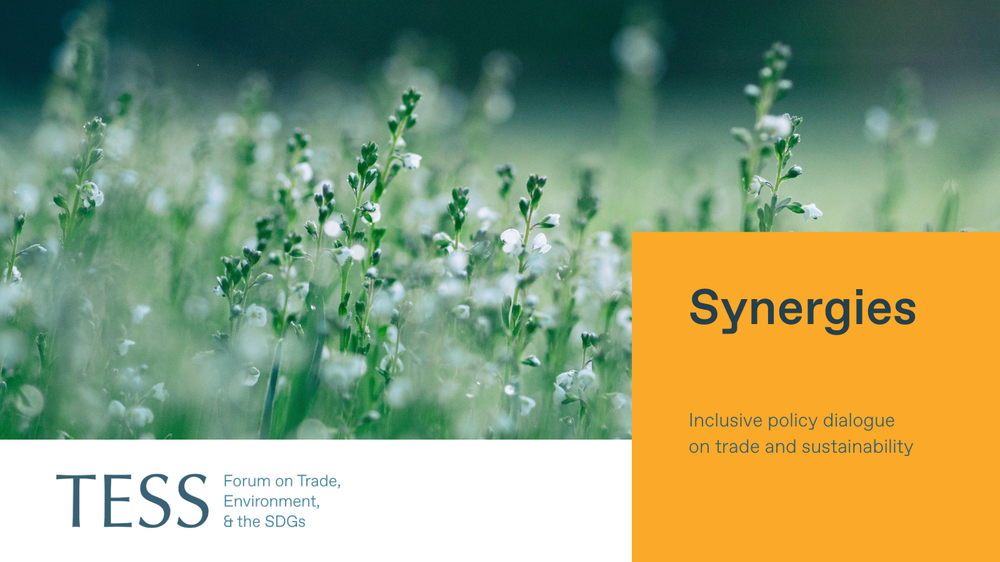
We invite you to read articles published over the past quarter in Synergies, the TESS blog dedicated to promoting inclusive policy dialogue at the intersection of trade, environment, and sustainable development, drawing on perspectives from a range of experts from around the world.
Reviving Multilateralism: From Vision to Action on Trade and Sustainability at the WTO
A new Synergies series, curated by TESS.
On the occasion of MC13, TESS was delighted to launch a new Synergies series titled From Vision to Action on Trade and Sustainability at the WTO. With the opportunity for constructive reflection on the state of play in the multilateral trading system and how to put sustainability at the top of the agenda, a core focus of the series is on reviving multilateralism. We invite you to read the following contributions on a wide range of topics.
Reshaping WTO Subsidy Rules for a Sustainable Future by Daniel C. Esty & Elena Cima (08 April)
Critical Minerals Initiatives for Green Supply Chains: How Multilateralism Can Help by Henry Gao, Weihuan Zhou, & Victor Crochet (15 March)
Sustainability at the WTO After MC13: Forging a Proactive Response by Carolyn Deere Birkbeck & Christophe Bellmann (14 March 2024)
There's a Great Future in Plastics – And Other Takeaways From the WTO MC13 Ministerial by Robert Howse (13 March 2024)
Trade in the Balance: Aligning the Trading System With Climate and Development Goals by Kevin Gallagher & Tim Hirschel-Burns (11 March)
Greening Supply Chains: Sleepwalking Into a New Era of Trade Policy? by Marion Jansen (07 March)
Climate and Trade Cooperation After the Thirteenth WTO Ministerial Conference: Quo Vadis? by David Kleimann, Jodie Keane, & Michai Robertson (07 March)
Trade Can Support the Achievement of a Nature-Positive Global Goal to Reverse Biodiversity Loss by Marco Lambertini (6 March)
Protecting Forests Through Sustainable Supply Chains: A Future Role for the WTO? by Brendan Vickers (05 March)
The Governance of Trade as if a Healthy Planet Really Mattered by Mark Halle (29 February)
Strong Ministerial Engagement is Needed to Strengthen International Cooperation on Sustainability and Trade by Carolyn Deere Birkbeck & Christophe Bellmann (24 February)
Voluntary Carbon Markets – Unfinished Business From COP28 by David Luke & Cecilia Wandiga (22 February)
How to Avoid Potential Friction in Future Trade in Climate Technologies by Brad McDonald & Scott Vaughan (22 February)
Pathways Exist for the Appropriate Design and Implementation of Trade-Related Climate Measures by Ujal Singh Bhatia (22 February)
WTO Reform: A Catalyst for Transformative Change in the Caribbean Community by Jan Yves Remy (22 February)
Transparency is Vital to Sustain State Support for the Clean Energy Transition by Simon J. Evenett & Fernando Martin (22 February)
The WTO on Sustainable Trade: Far From Perfect, by No Means the Enemy of the Good by Kimberley Botwright (22 February)
Why Delivering a Fisheries Subsidies Agreement Matters for Small Islands by Matthew Wilson (14 February)
Our Quarterly Graph
WTO Bodies Where Trade and Environment Issues Arise
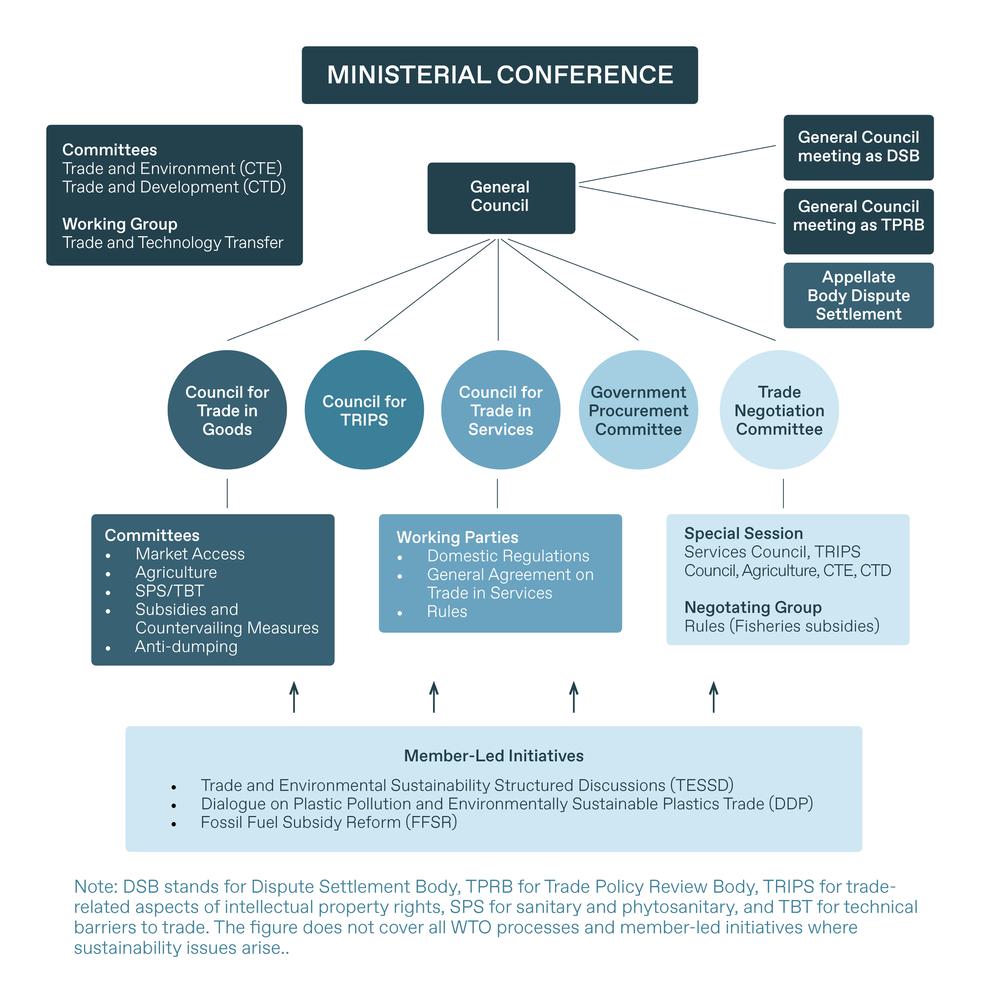
Our quarterly graph is taken from a policy brief authored by TESS on Trade and Environment at the World Trade Organization: State of Play and Entry Points. The figure provides a schematic overview of WTO bodies where environmental discussions have arisen over the years, even if sporadically. It also includes the initiatives on environment and sustainable development led by different subsets of WTO members. The figure does not cover all WTO processes and member-led initiatives where sustainability issues arise.



